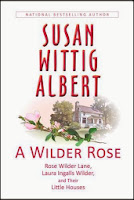from the Tuesday, November 12, 2013 edition of the Boerne Star
 It was
It was From the time that they were first published in the 1930’s, the “Little House on the Prairie” books have captured the hearts of both children and adults. These endearing stories of life on the American prairie chronicled a much simpler time in history, a nineteenth century lifestyle filled with stories of a close-knit family overcoming obstacles as they built their homestead and helped settle this country.
While Albert ’s
book is fiction, it is based on fact. She used Wilder’s and Lane ’s
diaries, journals, letters, and
scholarly research materials as her guide. Just as Wilder and Lane
were true to real life events in the “Little House” fictionalized stories, Albert
is just as true to history in A Wilder
Rose.
Not only did Rose
feel that she was deprived the mothering she so desperately wanted and needed,
she suffered from the absence of childhood friends. Her classmates poked fun at
her bare feet, shabby clothes, and odd ways. Rose
was envious of the other girls’ fancy store-bought dresses and she longed for
even the plainest pair of shoes. She was an outsider, not only because of her
clothes, but also because her behavior was bizarre—she even spoke her own
language that she called “Fispooko.” Rose
learned at a tender age to conceal her true feelings behind a fictional façade
and she carried that trait with her throughout her life.
There was not enough money for Rose
to attend college, so she taught herself to write and learned several languages
on her own. She worked as a journalist, some would say a “hack,” for
publications such as the “San Francisco Bulletin,” the “Call,” and the Red
Cross. Many of her stories were filed from distant locations—Paris ,
Russia Albania —and
she lived a rather wild, bohemian lifestyle. Rose
made enough money to travel to exotic places and to flit in celebrity circles.
She subsidized her parents’ income so that they could have some comfort in
their advanced years.
It was largely because of Rose ’s
generous financial assistance that Laura gained
the freedom to establish her credibility in her community. She joined ladies’
circles and began writing for the “Missouri Ruralist” and other farming
publications. Throughout Rose ’s life, she and
her mother had a contentious relationship—sometimes openly, sometimes
passively, but always grating just under the skin with only a word or slight
causing an eruption.
The stock market crash of 1929 wiped
out Rose ’s and her parents’ savings. Rose
began ghost writing books for Lowell Thomas, Frederick
O’Brien Hollywood
celebrities. Publishing houses took a beating during the great depression, but Rose
was a prolific writer and managed to stay afloat. Laura
had toyed with the idea of writing accounts of her childhood on the prairie and
she sought Rose ’s advice about the possibilities
of publishing these stories. Rose saw a possible
market for fictionalized versions of Laura ’s
life and, through her own agents and publishers, she made sure that her
mother’s books were given an opportunity to succeed in the marketplace.
Rose dutifully typed up the stories
that Laura wrote by hand on orange tablets, sprucing them up and adding her own
editorial flourishes and she was able to secure good publishing deals for Laura.
“A Wilder Rose” is a fascinating
story of a complex mother-daughter relationship and is a departure from Albert ’s
serialized fiction. On the surface, the “Little House” books are uncomplicated,
simplistic stories of life on the American prairie but Albert
does a masterful job of carrying the reader through the complexities of the
evolution of Rose and her mother.
For “Little House” fans this book is
essential reading. For Susan Wittig
Albert
“A Wilder Rose :
Rose Wilder Lane , Laura
Ingalls Wilder Susan
Wittig Albert 978-0989 203500, Persevero Press, September
2013.










No comments:
Post a Comment